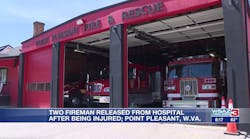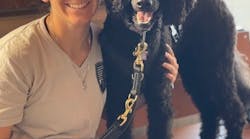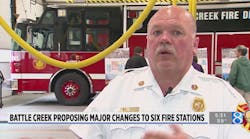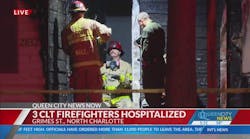The United States, I believe, is blessed with the best damned emergency responders, period. Fire, rescue, EMS, training, certification, equipment, you name it. We are, in my mind, the best of the best. And in your heart you should believe that your fire department, your EMS service, your engine, truck, squad, ambulance, paramedic unit, is the very best that there is. And your belief should be genuine - when you wear the emblem of your service it should be with pride, dignity, and ultimate humility. For the fire service you see, does not belong to us. It was here long before any of us were around and it will be here long after all of us are gone - and it will endure.
That is as it should be - we are stewards of a gift entrusted to us by those who have gone before. Proud responders who risked their lives and faced down incredible dangers for no other reason than to protect and serve their community, and at a time when there were no seatbelts, SCBA, enclosed cabs, or personal protective equipment to shield them from the very same dangers you face today.
And they were proud, and fierce, and arrogant - you can see it in their eyes in pictures on the walls of fire stations and museums, their voices almost pouring out of those images to tell us stories of their exploits and events. "We are the best of the best" their faces proclaim - They were invincible, fearless and courageous. They responded, fought, lived, and died in much the same way that we do today.
Courage, it is said, is not the absence of fear - it is, rather, action in the face of fear. It is about the idea of service above self when the most imperiled call upon us to place ourselves between harm and those we have sworn an oath to protect. It is important to remember that oath - whether spoken or unspoken. The moment you were called to duty; sought out, and were accepted into this family (and it is a family) you became part of something bigger than yourself. There is a rarely spoken and certainly unwritten part of that oath that strikes at the heart of who we are and what we do - it is the promise we make to each other. It is the part where we look each other square in the eye and know that when one of us is trouble, the rest of us will be there.
We expect our actual families (moms and dads, brothers and sisters, wives and husbands, children) to accept the risks of that oath when we take it. You see, that oath does not stop with us. When we sign up, we are signing our families up, and we expect them to willingly accept the consequences of our actions without question, without hesitation, without reservation. Although our families never want to lose us we expect them to understand and accept that if one of us is called to make that ultimate sacrifice, we were exactly where we wanted to be - doing exactly what we wanted to do.
We commemorate the death, and more importantly, the life of a brother or sister responder fallen in the line -of -duty with such pageantry. Class A uniforms, apparatus processions, caissons, honor guards, trumpets, bagpipes, and bells. We do all of this to honor their life of service, and because we do not know what else to do in our time of grief, and ultimately because we cannot do the one thing that we want to do more than anything else ... bring that loved one back to their family. We know also that, but for the grace of God, go us. We bury our hearts, our feelings, our guilt. We know the real truth about the circumstances of their death, because we are on the inside. We know things that those outside of the service do not know.
It does not take courage to plan, lead or participate in a LODD funeral; erect a monument; or establish a trust fund - these are things that may make us feel better, but do little to erase the pain of those left behind. They cannot fill the void of children left without a parent, wives without a husband, daughters with no one to walk them down the aisle on their wedding day, sons without a role model; parents burying one of their children. These thoughts do not enter our minds while we are busy feeding our egos as we break every common sense rule designed to keep us alive.
Don't get me wrong, I know full well that it is possible to be doing absolutely everything correctly and still get dead doing this job. Still, we are not held accountable nor do we take responsibility for those of our own whom we promised we would bring home and did not. They may occur - there are in fact times when we walk the extremely fine line of risk vs. benefit and occasionally, not often, but occasionally, the fine line crosses against us. But our willingness to recognize this fact should never be mistaken as an excuse not to do everything we can, every day, to bring our people home - alive!
What takes courage is to stand up and proclaim "No More ... Not on my watch" - no more men or women under my command are going to die needlessly because I failed to listen to the voices of those calling out from beyond. If they were here today, they would tell you themselves. The question is, do you hear their message? The single most disrespectful thing you can do to the memory of a brother or sister who has given their life in service, is to fail to learn the lessons necessary to avoid traveling the same road - it is as bad as killing them all over again.
It takes courage to do the hard right, particularly when the hard right is not popular. It takes courage to say "we cannot afford a line-of-duty death" and mean it. It takes courage to look across the engine cowl and say "hey, put your seatbelt on". Not because the rules say so, not because a chief ordered it, not because standards or even state law require it, but for no other reason than you are my brother - and I love you.
Having the courage to be safe has less to do with safety and more to do with a covenant - a covenant of men and women. It is leadership in action and a promise made to members and their families alike that says we value life over death; that line-of-duty deaths do not have to be an "accepted" part of who we are and what we represent.
Here are things you can do now, right now, to make a change:
- Get a physical. It takes infinitely more courage to face down your health problems than to ignore them. You cannot ever hope to lead others if you cannot or will not lead yourself, first. After that, mandate physicals for all of your firefighters - and then make the hard decisions to look a member in the eye and explain why they cannot, or should not, continue to serve on the front line. No member would ever want to live with the knowledge that their health problem cost another member their life.
- Fight for residential sprinklers in all homes in your community. Less than 1% of all homes in America are sprinklered today and over 3,000 civilians and 90% of the firefighters who die in burning buildings - die in a residential setting - five feet from a door or window. You cannot say you are committed to bringing your own people home alive and not support such efforts - we die in single-family homes because the home was not sprinklered, period.
- Mandate seatbelt use and actually require your responders to wear them. Words on paper are nearly meaningless - seatbelts do not get worn because the chief mandates them in some policy or rule, seatbelts get worn because chauffeurs do not move the apparatus until everyone is wearing their seatbelt. Officers, drivers and firefighters need to be held accountable and ultimately someone on that rig needs to be the designated adult - decide who that is going to be and then hold them accountable.
- Reduce the incidence of red lights and siren use; 25% of emergency responders die responding to an alarm. When lives hang in the balance, drive safely and use all of your emergency systems. I once had a much wiser and older captain tell me "kid, you cannot make up time on the highway. Once you leave the station you are at the mercy of a crazy and indifferent public. The only thing you can do is turn out quickly". Firefighters should never die responding to a dumpster fire, or wires down, or any of the other 17,000 types of calls we go to every day that do not involve lives at risk.
- Act professionally. Professionalism has nothing to do with pay status, it has every thing to do with your actions. Actions define reputation which precedes you everywhere you go - recognize that sometimes putting the needs of your community first is really what it is all about, not satisfying some personal desire to "beat someone into their first due area" or "get first water on a fire". Five year olds, teenagers, and firefighters all have something in common: they are fearless, take unacceptable risks, and think they are invincible - none of which are true.
- Recognize your scope of influence - and then exert all of the influence you possibly can within that area. If you are a firefighter, your scope of influence is within you and everyone with less time in service. If you are an officer, be an officer! Do not worry about being liked - worry about earning respect. When your people know that you care most about making sure they come home alive (your primary job) they may or may not like you, but they will surely respect you and your commitment to them. Your greatest success will be to make your company, your department, your crew, the very best that they can be. And your actions will speak for themselves - the fact of the matter is that greatness draws great people and great people carry on greatness. This is not theoretical; follow ugly kids home and you find ugly parents. You should not hang around people whose nicknames include "crash".
The fire service is the greatest gift we have ever been entrusted with. It is ours to cherish and our job is to leave it better than we found it even as we pass it on to our sons and daughters. History should reflect that it was us, in this time, who cared so much for our fellow brothers and sisters that we did everything we could to reach the goal of "everyone goes home".
What are you prepared to do?
Matthew Tobia is a Captain with the Anne Arundel County Fire Department in suburban Baltimore, MD. With more than 18 years of experience, Captain Tobia is currently working as the station commander at the department's newest fire station located in Severn (Station # 4).
Captain Tobia holds a B.S. from the University of Maryland and is a nationally certified Fire Officer III and Instructor II. He teaches extensively throughout the United States and is an adjunct instructor at the Pennsylvania State Fire Academy. He has served on curriculum development teams in Maryland and Pennsylvania.
Captain Tobia is active in supporting the National Fallen Firefighters Foundation and the Mid-Atlantic Burn Camp for Children. He can be reached at [email protected].





